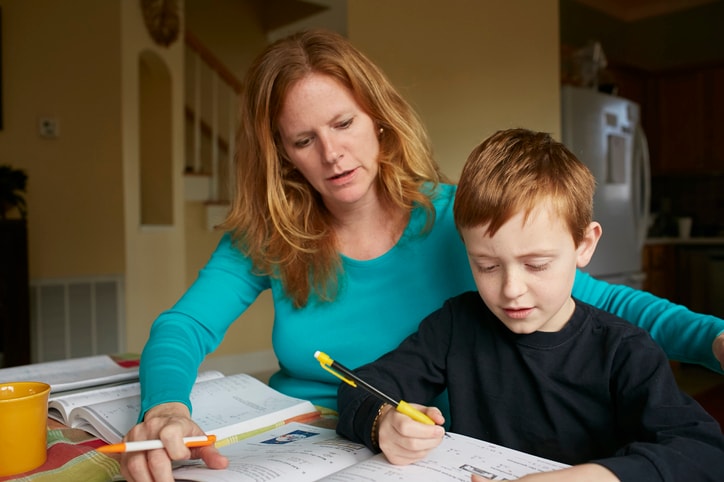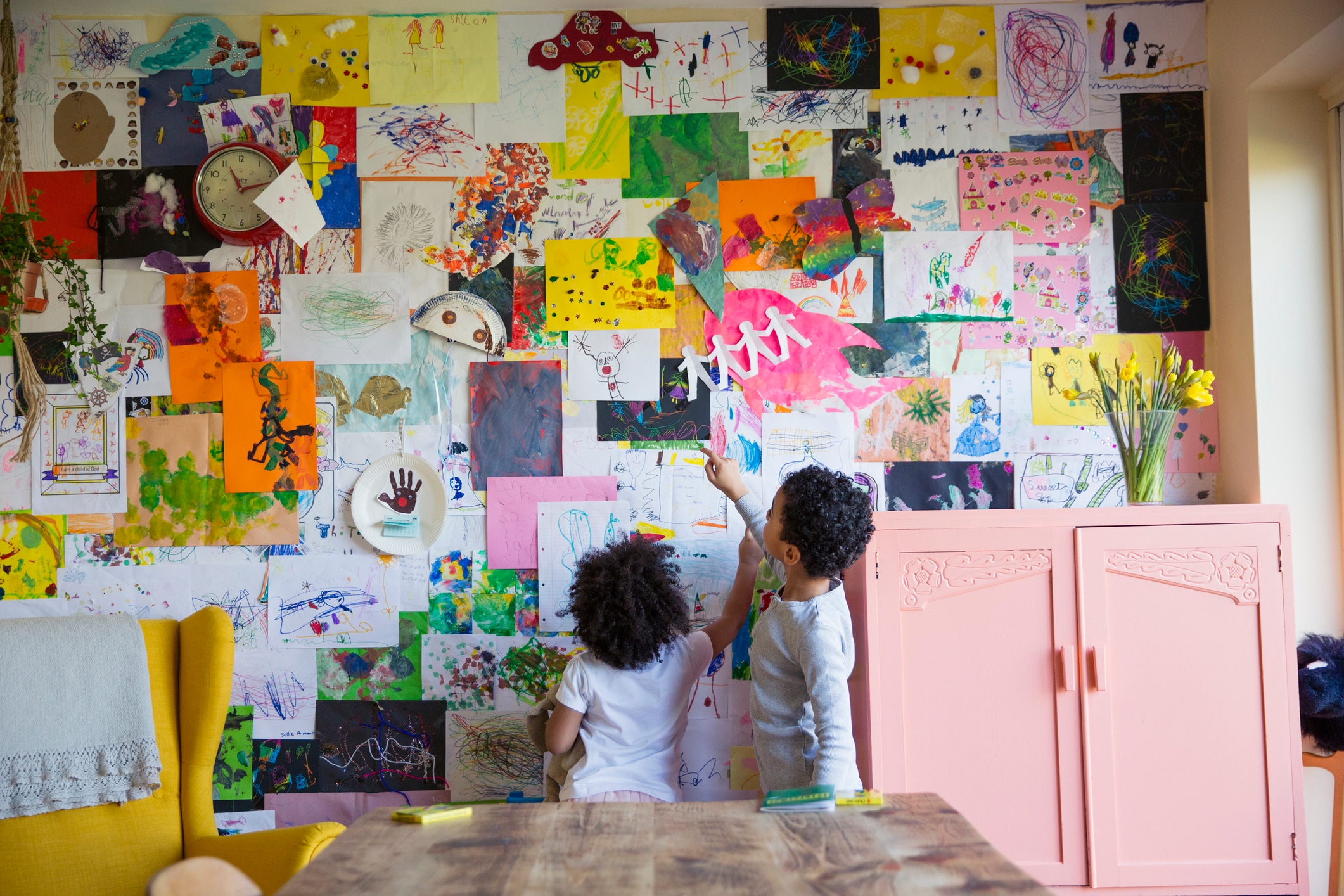Witnessing your child make a mistake, experience failure or struggle with stressful emotions is challenging for any parent. But for helicopter parents? It’s flat out unbearable — which is why they “hover” close to their kids in order to intervene at the first sign of a tough situation, whether it be social, emotional or academic. Sound exhausting? It is, and today, helicopter parents are not only burning out their children with their micromanaging, but themselves, too.
So what exactly is helicopter parenting? We spoke with top experts in the fields of child and family psychology to define what it means to be a helicopter parent, how it impacts both kids and caregivers, plus the best ways to avoid falling into the helicopter parenting trap.
What is helicopter parenting?
Helicopter parenting refers to a parenting style adopted by caregivers who are overly involved in their children’s lives, often to the point of controlling every aspect of their activities and decisions, explains Samantha Quigneaux, a licensed marriage and family therapist and the national director of family therapy services at Newport Healthcare.
“Helicopter parents may also correct their child frequently and have strict rules and expectations in an effort to help their child achieve success,” adds Amanda Zayde, a doctor of psychology and the director of the Connecting and Reflecting Experience (CARE) at Montefiore Health System. “They may also limit their child’s opportunities to make their own choices.”
In general, helicopter parents are known to “bail out” their kids when tough situations arise and solve their problems for them, explains Lea Theodore, a licensed psychologist and professor at the Gordon F. Derner School of Psychology at Adelphi University in New York. “Although virtually all parents and caregivers want the best for their children, a helicopter parent’s efforts to protect their children often fails to foster the independence children need to succeed on their own,” she says.
How the helicopter parenting definition is changing
While definitions of the four most well-known parenting styles have remained consistent through the years, the helicopter parenting definition continues to evolve, according to experts.
The concept of helicopter parenting was first introduced by child psychotherapist Haim Ginott in 1969 in relation to the negative parent-child relationship that can form between teens and overbearing caregivers. In 1990, child development researchers Foster Cline and Jim Fay coined the specific term “helicopter parent” to describe how overprotective “hovering” behavior was becoming increasingly prevalent among parents with children of all ages.
“Helicopter parenting is just as prevalent today as ever, but I’d argue it has morphed into something that’s being referred to as intensive parenting,” says Jeannine Jannot, author of “The Disintegrating Student: Struggling But Smart, Falling Apart & How to Turn It Around” and a Roswell, Georgia-based parent and student coach who holds her doctorate in child and developmental psychology. Intensive parenting refers to a style of parenting that not only revolves around “hovering” to stay overly involved in a child’s life, but investing an increasing amount of time, money and energy to ensure a child’s ‘success,’ she explains. This can take many forms, including micromanaging grades and assignments through online portals to prevent bad grades or spending more money on extracurriculars, sports or tutors.
So, why are helicopter — or intensive — parents doing more than ever? Much of it has to do with today’s educational achievement culture, or the widespread belief that the better a student performs in school, the better their chances of success, according to Jannot. This idea has both increased the stakes — and competition — when it comes to getting into college, and helicopter parents are swooping in more than ever to try and help. In fact, most parents Jannot works with say they feel completely responsible for their kids’ academic success.
“The thinking is that their kid needs really good grades, [academic] rigor and impressive extracurriculars to get into a ‘good’ college in order to be successful and happy in life,” Jannot says. With standardized test scores playing such a big role when it comes to getting into college, the process can feel very data driven which is fueling many helicopter parents to feel even more pressure and, in turn, intervene even more, she explains.
“Helicopter parenting is just as prevalent today as ever, but I’d argue it has morphed into something that’s being referred to as intensive parenting.”
—Jeannine Jannot, a parent and student coach who holds her doctorate in child and developmental psychology
Examples of helicopter parenting at every age
Helicopter parenting can occur through all stages of a child’s development. Here, experts share age-by-age examples of helicopter parenting and how they impact kids:
Helicopter parenting of toddlers
“Helicopter parenting patterns can start as early as not allowing your toddler to fall when learning to walk and catching them every time — even when there is no risk of injury,” Quigneaux says.
Other examples of helicopter parenting at this age are hovering over a toddler as they play on the playground, not allowing them to interact with other children without close supervision, directing their play or speaking for them. This overprotective behavior depletes opportunities for kids to gain confidence and mastery over new skills, according to Jannot.
Helicopter parenting in preschool
Being overly protective is still a go-to trait for helicopter parents during the preschool stage, as is the tendency to overhelp. For example, helicopter parents may volunteer in a child’s classroom in an excess amount in efforts to make decisions for them to avoid them experiencing any pain, unhappiness or discomfort, Quigneaux explains. They may also tell their children what toys they may play with and even dictate who they can be friends with.
“Helicopter parents may do too much for their kids [at this stage] rather than let them do age-appropriate things,” Jannot adds. This is a developmental period that is marked by limit-testing that is necessary to develop a sense of self, she explains. “Too much ‘helicoptering’ here may contribute to feelings of anxiety or rebellion.”
Helicopter parenting in elementary and middle school
When kids start elementary school, helicopter parents most notably start to micromanage academic work, according to our experts. Helicopter parents may complete or oversee homework assignments, closely monitor grades and even meet with their child’s teacher or principal to demand grade changes or accommodations, notes Theodore, who has provided educational counseling to both families and students for over two decades.
On the social front, helicopter parents may overschedule their school-aged children’s activities, provide conflict-resolution with friends or clean and organize their child’s room, Theodore says. But this can backfire in a big way at this stage because tweens are naturally prone to pull away from their parents in favor of their peers during middle school years, Jannot explains. “Family conflict can escalate during this time if parents are trying to manage their kids’ lives too much.”
Helicopter parenting of in high school
Many helicopter parents kick micromanaging into high gear around academics in high school with the belief that “perfect” grades are necessary to be successful after graduation, Jannot explains. “Parents are often checking school grading portals daily and texting their children at school with questions, concerns or other thoughts,” she says. “What I hear from my student clients is that this triggers immense anxiety and is hurting their relationships with their parents.”
What leads to helicopter parenting?
Anxiety and fear are the biggest contributors to the helicopter parenting style, according to our experts. “Managing the urge to hover requires parents to be able to notice and manage their own anxiety in order to support their child’s learning and exploration,” Zayde says. “When parents really struggle with this kind of worry and self-regulation to the extent that it impacts their behavior, they may engage in helicopter parenting.”
Here are the most common triggers that lead to helicopter parenting today:
Desire to prevent ‘dangerous’ outcomes
“Parents who worry about the consequences if they don’t manage and intervene are most likely to engage in helicopter parenting,” Jannot says. “In my coaching, parents often tell me that they don’t want to be a helicopter parent, but the consequences feel too high if they don’t.”
These consequences can include both real potential dangers, including substance abuse and unsafe social media use, or perceived threats such as bad grades or bad friend influences.
Feeling the pressure to be perfect
A primary reason parents engage in helicopter parenting is the tendency to define aspects of their own self-image in terms of their children’s lives, Theodore explains. “[They believe] their children are a reflection of themselves, as well as their parenting skills,” she says. “Hence, parents hover ever more to maintain an image of being good parents with perfect children.”
“Parents may have been raised in an unsupportive or emotionally negligent household and want to ensure their child never has to suffer the same way they did. These traits are often rooted in anxiety about their child’s safety or fear of failure for their child.”
—Samantha Quigneaux, a licensed marriage and family therapist
Personal childhood trauma
The helicopter style parenting often stems from the caregiver’s own childhood, explains Quigneaux. “Parents may have been raised in an unsupportive or emotionally negligent household and want to ensure their child never has to suffer the same way they did,” Quigneaux says. “These traits are often rooted in anxiety about their child’s safety or fear of failure for their child.”
Theodore refers to these helicopters as “reactionary parents” who hover because they believe their own parents were not sufficiently involved in their lives. “In essence, these parents overcompensate because of their own subjective experiences as children growing up,” she says.
The effects of helicopter parenting
Unlike authoritative parenting or gentle parenting, which experts agree can offer benefits for the entire family, the helicopter parenting style is only known for its drawbacks. According to Quigneaux, negative effects of helicopter parenting during adolescence include:
- Lowered self-esteem and self-confidence
- Increased anxiety and stress in unfamiliar situations
- Inability to make independent decisions
- Difficulty dealing with failure
When it comes to long-term consequences of helicopter parenting, the negative effects extend even further and get more complicated, according to experts. They include:
Delayed development in relation to peers
Children and teens who have helicopter parents learn to be more fearful of the outside world and new challenges which can make them appear more immature than their same-aged peers, Jannot says. “In fact, we are seeing recent generations seeming ‘younger’ than their chronological ages,” she says. “For example, it’s now more common for teens to postpone or even opt out of getting a driver’s license.”
Strained family relationships
“In the short term,it’s all about getting through high school and getting grades that amount to what we’re told our definition of ‘success’ should be,” Jannot says.
Jannot worries that this hyperfocus on academic success comes at the cost of parents’ relationships with their kids. “The last thing they want is to be judged on their academic performance by their parents,” she notes. “They already feel the pressure at school, and this really pushes our kids away from us.”
Mental health conditions later in life
Young adults with helicopter parents may also suffer setbacks in college and beyond. “In my coaching, what I see is these young adults who leave home fall apart,” Jannot says. “This is because they lack the experience and resilience that’s required to navigate this life transition because someone has always taken care of things for them.” These young people may also experience anxiety, depression or substance misuse, she notes.
Parental burnout
It’s not just children who are feeling the negative effects of helicopter parenting. Caregivers are feeling the pressure to take on an enormous amount of extra responsibilities, Jannot says, and it’s leading to more parental burnout. “When it comes to education, many parents today report feeling responsible for their children’s academic achievements and success,” Jannot says. “That’s a tremendous amount of pressure and an unrealistic and unhelpful expectation that is at the root of a lot of the struggle families are encountering.”
How to avoid helicopter parenting
To avoid becoming a helicopter parent, Quigneaux recommends encouraging your kids to be more independent and to face more challenges without setting strict boundaries on how they tackle them. “Have conversations with your child about how you are excited for them to learn and grow and will be there to support and work collaboratively with them,” she says. “If a parent is struggling with letting their child have more independence, they can seek support from a family therapist who can teach them skills and tools.”
Struggling to break out of a helicopter parenting pattern? “As a recovering helicopter parent myself, I have great empathy for how hard it is to let go,” Jannot says, who is the parent of three children. Here is her top advice for overcoming a helicopter parenting habit:
Value your relationships with your children over academics
Be sure the expectations you have for your child line up with your family’s core values, not that of educational achievement culture, Jannot says. Examples of core values include kindness, resilience, creativity, curiosity and strength, as opposed to getting perfect grades.
Pause before stepping in to solve a problem
“This requires some self-awareness and noticing when you are fearful and feeling compelled to ‘help,’” Jannot says. “But if you can give them the opportunity to learn how to manage their own lives, they will feel more confident, competent and connected to you.”
Prioritize trust and communication above all else
“Letting any process unfold the way it’s meant to requires trust,” Jannot says. “What that trust looks like in parenting is communication. It’s a lot of listening, empathy and respect. Being a warm and safe place as they go through the tumultuous process of growing up is actually one of the most protective things we can do for our kids.”
The bottom line on helicopter parenting
By being overly involved in their children’s lives, sometimes to the point of controlling every aspect of their activities and decisions, helicopter parents compromise a child’s ability to learn critical decision-making skills and independence. This can lead to delayed development, strained family relationships and even mental health conditions like anxiety and depression.
“Though the ‘hovering’ of a helicopter parent is often rooted in love, the way that love is being translated to their child can be detrimental to both parties,” Quigneaux says. “Parents need to find ways to care and love their child in a supportive and productive way instead.”





